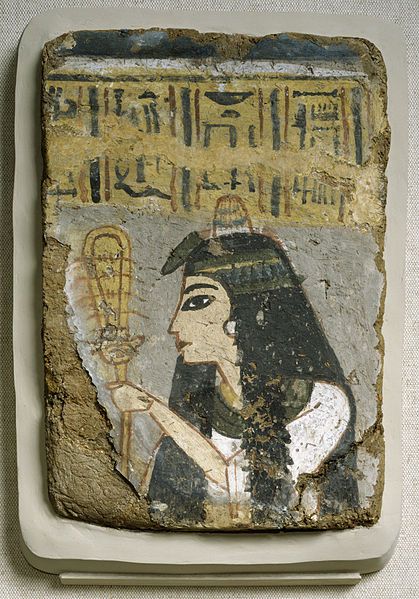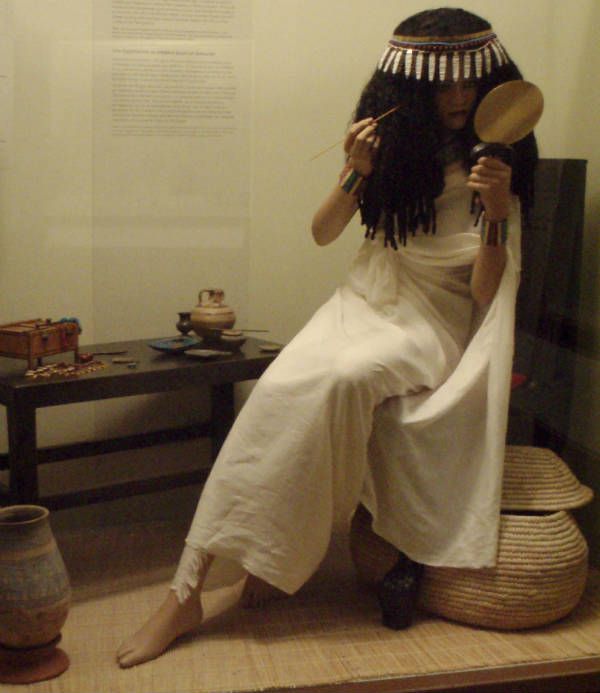Neatorama presents a guest post from actor, comedian, and voiceover artist Eddie Deezen. Visit Eddie at his website or at Facebook.
 Today, a great percentage of women (and a small percentage of men) apply makeup daily. There is a simple reason for this: they want to look good. The subtle (and sometimes not so subtle) touches of pigment and shade can make a huge difference. They can hide flaws in the skin and enhance the natural appearance of certain facial features.
Today, a great percentage of women (and a small percentage of men) apply makeup daily. There is a simple reason for this: they want to look good. The subtle (and sometimes not so subtle) touches of pigment and shade can make a huge difference. They can hide flaws in the skin and enhance the natural appearance of certain facial features.
In spite of a small microcosm of angry feminists, the "beauty industry" is a billion-dollar (trillion, maybe?) industry in America and around the world.
Call it vanity, if you must, but spending quality time in front of a mirror is a daily ritual millions of women can't do without, whether they're preparing for an average day at work, a big event, or a date with that special someone. It all goes back to the ancient Egyptians, who were the first women to wear makeup.
<!--ad1-->
In a way, the basic motive back then was the same as it is today- just like modern day supermodels, the well-to-do women of ancient Egypt wanted to look their best and saw the careful application of face-paint as a means to that end. But unlike today's modern women, they weren't trying to impress that cute guy at work or the guy at that important job interview. And the Egyptian women weren't trying to catch the eye of the burly construction foreman working on the pyramids or the local pharoah either. Their sights were aimed a little higher. They were trying to impress the gods.
But unlike today's modern women, they weren't trying to impress that cute guy at work or the guy at that important job interview. And the Egyptian women weren't trying to catch the eye of the burly construction foreman working on the pyramids or the local pharoah either. Their sights were aimed a little higher. They were trying to impress the gods.
Archeological evidence shows the Egyptian ladies were dolling themselves up as early as 4000B.C. This was mainly, or at least in good part, to please the gods, as the women felt their appearance was directly related to their spiritual worth. So the Egyptians created the first cosmetics (no word on whether they received makeovers at malls along the Nile).
They applied eye makeup called mesdement (from the ancient Egyptian word <>msdmt) a mixture of copper and lead ore, around their eyes. Green shades went on the lower eyelids; black and dark gray were applied to the lashes and upper eyelids. Dark colors were said to ward off "evil eyes".
To complete the ornate look around the eyes, they added almond shapes of dark-colored powder (later called kohl) that might have been a combination of ingredients such as burnt almonds, oxidized copper, copper ores, lead, ash, and ochre (think Johnny Depp as Captain Jack Sparrow or Keith Richards as Keith Richards). Kohl was believed to have medicinal benefits as well.
<!--ad2-->
 (Image credit: Keith Schengili-Roberts)
(Image credit: Keith Schengili-Roberts)
Egyptian women put a mixture of red clay or ochre and water or animal fat on their cheeks and lips- the first blush and lipstick- and applied henna to their nails. When it came time to remove all of these cosmetics at the end of the day, they used a type of soap made from vegetable and animal oils and perfumes.
Although these earliest beauty products the ladies put on were originally intended to please the gods, it doesn't take much imagination to consider the effect these doses of makeup had on the local Egyptian men (probably similar to the first cave girl who realized the effect her short animal skin dress had on the cave men and boys she walked by).
<!--ad3-->
The connection between beauty and spirituality remained for centuries, until the Romans gained power. The Romans adopted many of the Egyptians' cosmetic formulas, but their primary motive was to improve their appearance for each other (especially the Roman men). The "god factor" did not enter into it.
And ever since then, from the earliest Egyptian women and the earliest Roman women to Angelina Jolie and Jennifer Aniston to the high-school cheerleader to the teenage girl working her first job at the mall, the more things change the more things stay the same. As the sun rises in the east and sets in the west, the sight of a beautiful woman or girl turns heads, captures attention, and causes a great effect.
It brings one that most precious of all commodities: admiration. And in the end, isn't that what we all want?
<!--ad4-->






As for the one commenter who claimed men are more visually-oriented than women are, that's a load of crap. There is no basis for the argument whatsoever. And it is ideologically inconsistent with the stereotype that women care more about fashion and beauty and colors than men do; those are all enterprises governed chiefly by the faculty of human vision. It is also biologically inconsistent with the fact that women are often better able to discern color differences than men are.
And I was going to say what Chris said about Egyptian men. And let me add this: You're completely forgetting indigenous people who have worn makeup and tattooed themselves pretty much all along, at least for special occasions if not in fact every day. AND, the ancient Egyptians DID NOT represent the whole of the human species, and neither did the Roman Empire. If you're going to talk about various habits of the entire human species then quit making your discussions so Western-centric because I hate to break it to you but that's NOT the whole story. A human is a human no matter where they come from.